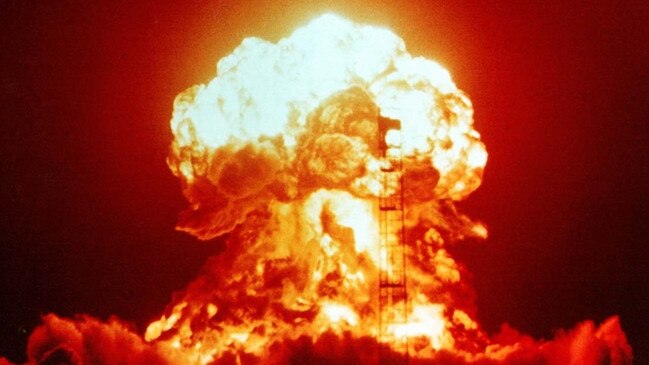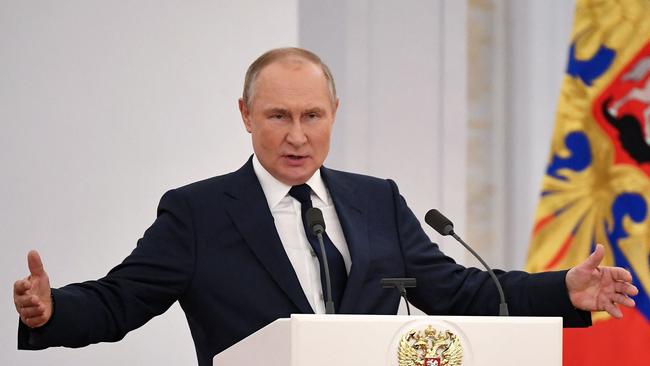Vladimir Putin poses real risk of breaking nuclear taboo in Ukraine
It seems unthinkable but we do not sufficiently appreciate the distinct possibility of nuclear-weapon use by Russia in Ukraine.

Sometimes a thing keeps nagging around your brain and though you’ve said it before you have to say it again. We factor in but do not sufficiently appreciate the real possibility of nuclear-weapon use by Russia in Ukraine.
This is the key and crucial historic possibility in the drama, and it really could come to pass. And once it starts, it doesn’t stop. Once the taboo that has held since 1945 is broken, it’s broken. The door has been pushed open and we step through to the new age. We don’t want to step into that age.
The war is in its third month. Diplomatic solutions are less likely than ever; war crimes and atrocities have hardened the Ukrainians, and in any case they’re winning and the world is on their side.
British intelligence this week reported Russia has lost around 15,000 troops, 2000 armoured vehicles and 60 aircraft.
The ground invasion force has lost an estimated 25 per cent of its combat strength. Russia is grinding through a disaster.
We aren’t worried enough about Russian nuclear use in part because we imagine such a thing as huge missiles with huge warheads launched from another continent and speeding through space. We think: That won’t happen! It has never happened!
But the more likely use would be not of big strategic nuclear weapons but smaller tactical ones on the battlefield. Such weapons have a shorter range and carry lower-yield warheads.
America and Russia have rough parity in the number of strategic nuclear weapons, but Russia has an estimated 10 times as many tactical nuclear weapons as the US and delivery systems that range from artillery shells to aircraft.
Why would Vladimir Putin use tactical nuclear weapons? Why would he make such a madman move?
To change the story. To shock and destabilise his adversaries. To scare the people of North Atlantic Treaty Organization countries so they’ll force their leaders to back away. To remind the world — and Russians — that he does have military power. To avoid a massive and public military defeat. To win.
Mr Putin talks about nuclear weapons a lot. He did it again Wednesday: In a meeting with politicians in St Petersburg, he said if anyone intervenes in Ukraine and “creates unacceptable threats for us that are strategic in nature,” the Russian response will be “lightning fast.”
He said: “We have all the tools for this that no one else can boast of having. We won’t boast about it, we’ll use them, if needed.”
He’s talked like this since the invasion. It’s a tactic: He’s trying to scare everybody. That doesn’t mean the threat is empty.
There are signs the Russians are deliberately creating a historical paper trail, as if to say they warned us.
On Monday Foreign Minister Sergei Lavrov said the risk of nuclear conflict is “serious” and “should not be underestimated.”
Earlier, Anatoly Antonov, Russia’s ambassador to Washington, sent a formal diplomatic note to the US saying it was inflaming the conflict.
The Washington Post got a copy. It said shipments of the “most sensitive” weapons systems to Ukraine were “adding fuel” to the conflict and could bring “unpredictable consequences.”
The US at the same time has become rhetorically bolder.
This month President Joe Biden referred to Mr Putin as a war criminal.
In March Mr Biden called for regime change; the White House walked it back.
This week Defense Secretary Lloyd Austin told reporters the US aim in Ukraine: “We want to see Russia weakened to the degree it can’t do the kinds of things it’s done in Ukraine.”
The original American aim was to protect Ukraine’s sovereignty and independence. Has the US strategy changed, or has its officials’ talk simply become looser? What larger strategic vision is the administration acting on?
In my experience with American diplomats, they are aware of but don’t always grasp the full implications of their opponents’ histories.
Mr Putin was a KGB spy who in 1991 saw the Soviet system in which he’d risen crash all around him.
He called the fall of the Soviet Union a catastrophe because it left his country weakened, humiliated and stripped of dominance and hegemony in Eastern Europe.
He is a walking, talking cauldron of resentments, which he deploys for maximum manipulation.
He isn’t secretive about his grievances. In his 2007 speech to the Munich Security Conference he accused the US of arrogance, hypocrisy and having created a “unipolar world” with “one centre of authority, one centre of force, one centre of decision making,” headed by “one master, one sovereign”.

As for NATO, “we have the right to ask: Against whom is this expansion intended?”
Antagonism to the West has been the central intellectual organising principle of his life. America is an object of his life’s obsession.
So let me make an argument for my anxieties: For this man, Russia can’t lose to the West. Ukraine isn’t the Mideast, a side show; it is the main event. I read him as someone who will do anything not to lose.
In October he will turn 70, and whatever his physical and mental health his life is in its fourth act.
I am dubious he will accept the idea that the signal fact of its end will be his defeat by the West. He can’t, his psychology will not allow it.
It seems to me he has become more careless, operating with a different historical consciousness.
He launched a world-historic military invasion that, whatever his geostrategic aims, was shambolic — fully aggressive and confident, yet not realistically thought through.
His army wasn’t up to the task. It seemed thrown together, almost haphazard, certainly not professional.
Richard Haass, president of the Council on Foreign Relations, often notes that Mr Putin has killed all the institutions in his country, sucked the strength, independence and respectability from them, as dictators do.
They take out power centres that might threaten them but might also warn them of weaknesses in their own governments. All dictatorships are ultimately self-weakening in that way.
But this means Mr Putin has no collective leadership in Russia. It’s all him. And he’s Vladimir Putin.
When I look at him I see a new nihilistic edge, not the calculating and somewhat reptilian person of the past.
People who have known Mr Putin have told me I am wrong in my concern about his potential nuclear use in that he knows if he makes one move with such a weapon, Moscow will in turn be reduced to a smoking ruin.
But I am reading Mr Putin as someone who’s grown bored of that threat, who believes he can more than match it, who maybe doesn’t even believe it anymore.
In any case the Americans would not respond disproportionately.
No one since 1945, in spite of all the wars, has used nuclear weapons. We are in the habit, no matter what we acknowledge as a hypothetical possibility, of thinking: It still won’t happen, history will proceed as it has in the past.
But maybe not. History is full of swerves, of impossibilities that become inevitabilities.
For the administration’s leaders this should be front of mind every day. They should return to the admirable terseness of the early days of the invasion. They should wake up every day thinking: What can we do to lower the odds?
Think more, talk less. And when you think, think dark.
The Wall Street Journal



To join the conversation, please log in. Don't have an account? Register
Join the conversation, you are commenting as Logout